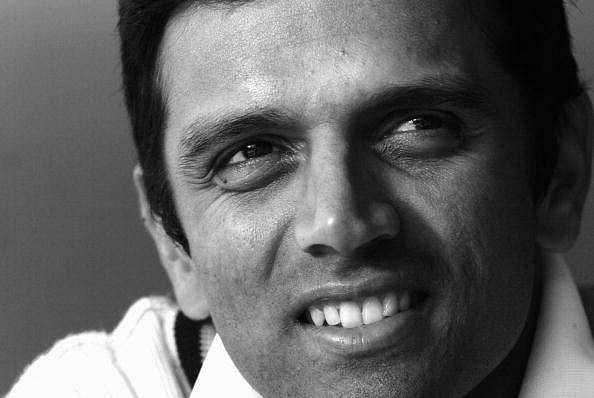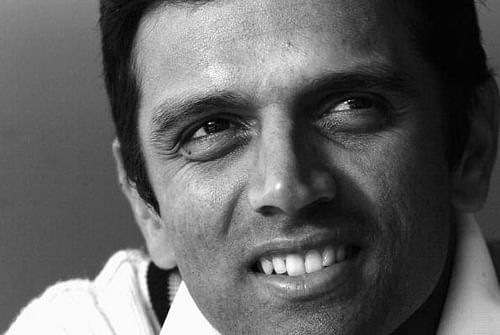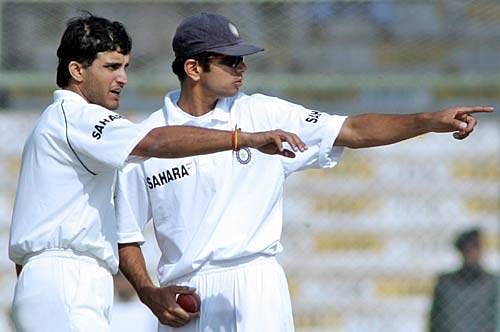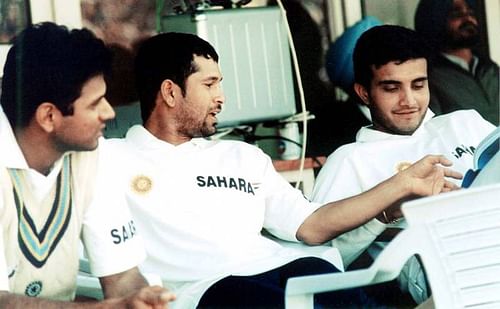
Rahul Dravid - Beyond the mask of stoicism

There was much enthusiasm not so long ago when the news of an elite advisory panel of the BCCI comprising Sachin Tendulkar, Sourav Ganguly, VVS Laxman and Rahul Dravid was doing the rounds. The euphoria surrounding the speculation elicited comparisons with the temporary managerial responsibilities that The Class of '92 was entrusted with at Manchester United after the unceremonious sacking of David Moyes towards the end of last season.
But the euphoria and enthusiasm have since been overtaken by controversy ever since Dravid rejected his role on the BCCI advisory panel. Adding fuel to the fodder of conspiracy theories was a report in the Hindustan Times that claimed that Dravid has rejected the offer to avert 'a battle of egos'. A senior BCCI official speaking on condition of anonymity said, "It seems he isn't comfortable working with Sourav. That's why his name isn't on the list."
For years, Dravid seems to have shared an easy camaraderie with Ganguly, enforced but sweet, which is the case when you play cricket together for years as legends for your country. The respect seems to be mutual as Ganguly is never short of praise for Dravid. Speaking in an interview back in 2012, Ganguly heaped praises on Dravid saying, “Rahul scored over 10,000 runs in ODIs, that’s a huge number. Rahul was a complete team man. Did what was asked of him.”
And who can ever forget Dravid's eulogy that has now passed into cricketing folklore? : "On the offside, first there is god, then Ganguly."
But professional sports has its fair share of highs and lows – it is a commonly acknowledged fact that the public perception of team spirit and goodwill that the management and administration love to create is often overshadowed by the chance revelation of unhappy events that were meant to be hushed up inside the dressing room. But the ghosts in the closet are real, as the saying goes, no matter how much they are detested because they push our powers of living in denial to its utmost limit.
Chappell’s role in driving wedge between India’s Big Three
When Ganguly was dropped from the national team in 2005, fingers were pointed both at Greg Chappell and Rahul Dravid. Chappell's tumultuous relationship with Ganguly is, of course, well-known, and his decision, it is popularly believed, was fuelled by his desire to work with Dravid at the helm.
Chappell made no secret of his profound admiration for Dravid and his leadership skills. In his book Rahul Dravid- Timeless Steel, Chappell wrote: "Had he been given the same wholehearted support in the role that he had given others, I think the recent history of Indian cricket may have been very different and he could have gone on to become the most successful Indian captain ever."

Continuing his veiled jibe at Ganguly while commending Dravid, Chappell added, "He was an excellent deputy, in that he gave whole-hearted support without ever thinking he might be better than the incumbent, and when he got the job he was a much better captain than he will ever be credited with."
What is interesting if Tendulkar's later claims are to be believed is that Chappell tried to oust Dravid in an identical fashion to hand over the captaincy to Tendulkar just before the 2007 World Cup.
Tendulkar wrote in his autobiography Playing it My Way: "Just months before the World Cup, Chappell had come to see me at home and, to my dismay, suggested that I should take over the captaincy from Rahul Dravid." "Together, we could control Indian cricket for years," Chappell had reportedly told a shocked Tendulkar.
Dravid characteristically has refused to react to Tendulkar's claim saying that he was not “privy to any private conversation between two individuals”.
Just before India were scheduled to play Australia in the opening test match at Melbourne in 2011, Ganguly's outburst against Dravid's lack of 'guts' to stand up to Chappell was considered by many to be ill-timed, though accurate. Ganguly has condemned time and again Dravid's lack of control over Greg Chappell.
Speaking about India's early exit from the World Cup back in 2007, Ganguly said, "I was not surprised to see India not qualifying for the next round (in 2007 World Cup). When I came back to the team, I had spoken to Dravid about that much later and told him that these were the things going on. He said he knew it all but couldn't control Greg."
It was precisely the kind of control Ganguly could exercise over John Wright which forged a successful partnership between them for years. Ironically, it was also this love for control, that led to the volatility of the Ganguly-Chappell relationship. Reacting to Ganguly's accusation, Dravid said, "If Ganguly is saying I could not control Greg Chappell, he is entitled to an opinion. He has played many years for India. But he can't put words in my mouth as I have never had any such conversation with him."
The extreme ‘Team man’
The other infamous incident that has come back to haunt Indian cricketing history through the ages is of course Dravid's surprise declaration at the Multan test in 2004 when Tendulkar was batting on 194. The decision shocked the entire cricketing world and earned the quiet indignation of the Little Master. Speaking on the incident years later, Tendulkar said, “I informed him [Rahul Dravid] that I was indeed upset and there was no way I would pretend otherwise. I asked him what the thinking was behind declaring at the time that he did. Rahul said that the call was taken with the interests of the team in mind.
“It was important to demonstrate to the Pakistanis that we meant business and were keen to win. I wasn’t convinced. First, I said to him that I was batting for the team as well. Yes, I had scored 194, but the 194 was meant to help the team and it was my individual contribution to the team’s cause. So to say that decision was taken in the best interests of the team wasn’t altogether correct.”
Fingers were pointed at Ganguly as well because Dravid was only the stand-in skipper in that match and many believed, including Tendulkar, that Ganguly had a role to play in that declaration. Tendulkar added, “Sourav came up to me and said he was very sorry at what had happened and that it wasn’t his decision to declare. This was a little surprising because Sourav, as a skipper, was part of the tea time discussion and was also present in the dressing room at the time of the declaration.”
An interesting parallel is Ganguly's declaration in the Sydney Test earlier in 2004 when Dravid was batting on 91. No one could tell if the declaration had upset Dravid – he was never going to show any emotion in any case. His face was the picture of inscrutable nonchalance as he walked off with a smile, blood oozing out of his ear after being hit by the Bret Lee bouncer.
Or think of the uncharacteristic reverse sweep to get out on 270 at Rawalpindi in 2004 – the only ungamely shot in an innings that had class written all over it.
But that is what Dravid has always been like - he would put the team ahead of his personal milestones always. Never one to stand up for his personal demands, continuous adaptation has been the hallmark of his career which saw him drop down to number five and even keep wickets for India for some time in ODIs.
Dravid was never about dancing down the crease to go for a fortuitous flash through the offside. He could have never had the impetuosity to risk the disgrace of taking off his shirt and waving it from the Lord's balcony. He was too much of a gentleman to have kept Steve Waugh waiting at the toss.
His stoicism was so rigorous that when he cut the ball through point for the winning runs and pumped the air with his fists in jubilation after the famous Test match victory at Adelaide in 2004, the joy of the entire nation beginning to celebrate was momentarily deferred by the collective incredulity at Dravid's euphoria.
Tired of shadow but too polite to conceive of a rebellion
The enduring image that comes to mind when we think of Dravid is his calm-headed front foot defence, ball after ball, on a turning track, with sweat pouring down his helmet. The adulation he received for his tireless services is considered to have been far less than he had deserved. His willingness to do just about anything in the interest of the team was unimaginable for any player at the helm of his popularity and potential, having ascended to the topmost rungs of stardom.

There was an interesting photograph in a popular English daily of Dravid fielding at first slip during the India-Pakistan Test series in 2004. Overlooking Dravid was the towering photograph of Ganguly featuring in a popular advertisement on the sightscreen at the back. The photograph came with a somewhat disturbing caption that seemed to epitomise Dravid's career - 'In his master's shadow' it read.
The recognition that Dravid, one of the towering greats of modern Indian cricket, has received has truly been secondary always to Tendulkar the batsman, and also Ganguly the captain. It is perhaps because of Dravid's unassuming generosity or his ability to be quietly comfortable in the shadow of his contemporary masters. It is impossible to imagine that he was not tired of the shadow, but he was too polite to conceive of a rebellion.